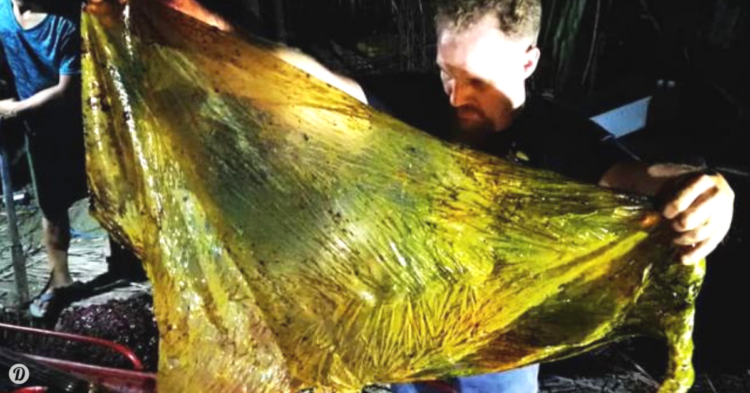Humans have always been a threat to whales, but for different reasons. Back in the day, this was because of hunting. Anti-whaling initiatives have been influential in curbing this practice, but despite this, whales are more threatened by ever — and it has nothing to do with humans hunting them.
The world’s oceans are full of garbage.

Think about how much plastic there is in the world, and how much of it is seen as garbage even though it takes forever to biodegrade. Then consider the fact that a lot of garbage winds up in the ocean.
It’s bad news for marine life.

Whether it’s a small fish choking on a small piece of garbage or a gigantic whale who inadvertantly swallows a lethal amount of plastic, these pollutants are killing sea creatures.
A recent story on this topic went viral.

The discovery by a marine biologist shone an uncomfortable light on the way that pollution affects whales. Before going further, just a reminder — this stuff is pretty difficult to look at.
A young whale washed ashore in the Philippines.

Unfortunately, it was too late to save it, as the whale was already dead. Now, not all creatures get to live to old age. But the details of this whale’s demise are disturbing.
They hauled the carcass ashore.

A marine biologist, Darrell Blatchley, identified the whale as a juvenile male Cuvier’s beaked whale. Wanting to know more, Blatchley decided to investigate just what led to this poor whale’s demise.
The cause of death was immediately apparent.

After cutting into the whale’s stomach, Blatchley found plastic bags. A lot of plastic bags. Needless to say, it’s not good to ingest plastic — and this whale paid the price.
The whale died a horrible death.

Blatchley told CNN that the whale died of dehydration and starvation. In its final moments, the poor whale would have been severely emaciated and vomiting blood.
It couldn’t get the nutrients it needed.

The sheer amount of plastic in its stomach — 88 pounds in all — blocked up the whale’s system, keeping it from being able to properly process the nourishment it needed.
It was shocking, even to Blatchley.

“I was not prepared for the amount of plastic,” Blatchley told CNN. “Roughly 40 kilos of rice sacks, grocery bags, banana plantation bags and general plastic bags. Sixteen rice sacks in total.”
It’s a deadly situation.

Every living thing needs water, but whales swim in salt water. This means they need to get all of their hydration from the food they eat. With its stomach full of plastic, this whale couldn’t eat anything.
It’s described as “disgusting.”

Blatchley’s group, the D’Bone Collector Museum, said the amount of plastic — reportedly the most they’d ever seen in the stomach of a whale — as disgusting. I’d say that’s an understatement.
The bags had been there a long time.

Plastic bags are not nutrients, so the body can’t process them. Blatchley said that some of the bags he found in the whale’s stomach had been there so long that they’d begun to calcify.
There’s a lesson here.

Single-use plastics are everywhere, and they’re deadly. The bags in this whale’s stomach aren’t much different from the plastic shopping bags so many of us use every single day.
Hopefully it creates change.

Humanity needs to get its act together. It’s difficult to look at a whale whose life was cut short by our garbage. But if it changes anyone’s habits, it’s absolutely a good thing.

















































